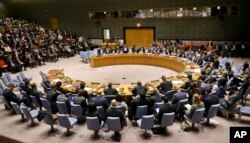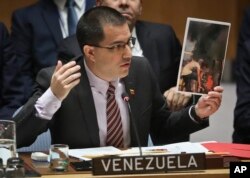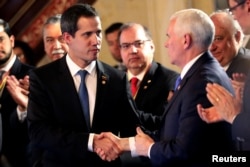A senior U.S. official said Tuesday the Trump administration would impose more sanctions on Venezuela in the coming days.
"We announced some sanctions yesterday, there will be more," Special Representative on Venezuela Elliott Abrams told reporters at the United Nations, where he addressed a meeting of the Security Council called by the United States. "There will be more this week. There will be more next week. We will continue to impose sanctions on high-ranking members of the regime and people who handle their financial affairs," he said.
Abrams also said Washington would bring a draft resolution before the U.N. Security Council for a vote this week, which would call for the entry of humanitarian aid into the country. Both Washington and Moscow have drafted competing resolutions on the issue but have not advanced them to a vote. Russia, a close ally of disputed President Nicolas Maduro, would likely veto a measure put forward by the United States.
Asked if the U.S. is preparing military action against the Latin American country, he said it is not.
"No. The president has said all options are on the table," Abrams said. "Presidents always say that, and rightly so."
Abrams said U.S. policy is to use as much diplomatic, economic and political pressure as possible to support the Venezuelan people's aspirations for democracy.
Inside the Security Council, the envoy urged new elections.
"The cure to this misery and tyranny is a free, fair and transparent election that embraces all sectors of society and all political parties," Abrams said.
He expressed concern for the safety of opposition leader and interim president Juan Guaido, who went to Colombia on Saturday for an international concert supporting humanitarian aid. Maduro has refused to let the aid into Venezuela, calling it the pretext for a U.S. invasion.
Maduro's foreign minister, Jorge Arreaza, addressed the Security Council for nearly 40 minutes on Tuesday. He urged the council to adopt a resolution rejecting the use of force against Venezuela.
"What are we asking for — rejection of the threat, or use of force against Venezuela? It may even be enough," Arreaza said. "But in addition to that, based on the U.N. Charter, there should also be a rejection of the blockade and the stealing of our natural resources, which is causing the suffering of our people."
U.S. Vice President Mike Pence met with Guaido Monday in Colombia. He also announced sanctions against four Venezuelan state governors who back Maduro.
Pence said the U.S. will contribute an additional $56 million in aid to Latin American countries who are taking care of the more than 3.4 million Venezuelans who have fled the country since 2015.







